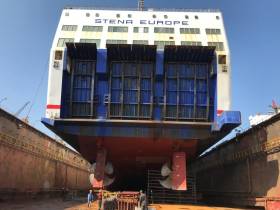Displaying items by tag: Tuzla, Turkey
Rosslare-Wales Route Ferry Departs Europe to Undergo Significant Refit Upgrade in Turkey
#ferries - The Rosslare-Fishguard ferry Stena Europe is off service and is currently undergoing a significant three-month refit visit at a shipyard located outside Europe.
Last month Afloat monitored the Ireland-Wales ferry having left familiar waters when off Spain and prior to taking on bunkers in Gibraltar and entering the Meditteranean. According to Stena Line the ferry is at the Gemak Shipyard in Tuzla. The yard is located in the province of Istanbul, Turkey on the Asian side of the city.
The 24,828 gross tonnage ferry which was introduced on the St. Georges Channel route in 2002 is scheduled to return late June 2019 and during the visit a number of upgrade projects will be completed.
One of the most significant projects to be undertaken includes modifications to the deckhead levels on the main vehicle deck to allow for the carriage of full-height trailers across the whole of the main vehicle deck. Prior to arrival at the Turkish shipyard, Stena Europe was restricted to carrying full-height trailers on its port side only.
Other works will include the renewal of the majority of the ship’s windows, engine and hull overhauls including blasting the whole hull to remove all the existing old paint work to improve fuel efficiency and the ships appearance.
Internally, the passenger stairwells will be revamped, a redesign of the Barista Coffee outlet, as well as upgrades to the passenger Information Desk and other decor improvements. During the refit period, the Stena Europe has been replaced by the Stena Nordica on the Rosslare-Fishguard service.
Ian Davies, Stena Line Trade Director (Irish Sea South) said: “Our ongoing ship refit programme is an important part of our business operation ensuring that our fleet operates to its maximum efficiently and is further evidence of Stena Line’s rolling investment programme for the region. The Stena Europe is an important part of our Irish Sea South fleet and we look forward to welcoming a revamped vessel back to our Rosslare-Fishguard service in the summer with the capacity to accommodate even more full-height trailers while still carrying up to 1, 400 passengers.
This is an important year for Stena Line on the Irish Sea as preparations are made to receive the first of its new generation E-Flexer series vessels, the Stena Estrid, which is scheduled to enter service on the Dublin to Holyhead route in early 2020, the first of three new E-Flexer vessels bound for the Irish Sea region..
Stena Line is the largest ferry operator on the Irish Sea, operating routes between Ireland and Britain, including Dublin to Holyhead, Belfast to Liverpool /Heysham and Belfast to Cairnryan. In addition a continental direct service to France between Rosslare and Cherbourg.





























































